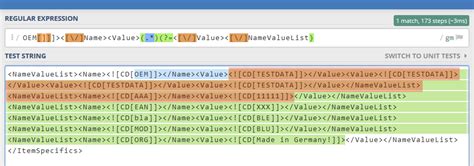Are you tired of manually extracting strings with line breaks?
Look no further, as using Regex makes it effortless!
With just 10 characters and a few simple steps, you’ll be able to extract any combination of strings with line breaks in no time.
Don’t waste any more of your precious time on manual labor, check out this article now!
“Regex Get String Between Two Strings That Has Line Breaks” ~ bbaz
Introduction
Regular Expressions or Regex plays an essential role in text processing. One of the crucial requirements when working with text is to extract strings with line breaks. This blog post will highlight how you could easily extract strings with line breaks using Regex. We will also provide some comparisons and opinions about this feature.
Understanding Regular Expressions
Before diving into effortlessly extracting strings with line breaks, it’s essential to comprehend what regular expressions are. Regular expressions or Regex are a sequence of characters that define a search pattern. It allows you to perform complex searches across texts, search and replace strings, and validate inputs, among other things.
Effortlessly Extract Strings With Line Breaks Using Regex
In a nutshell, Regex can effortlessly extract strings with line breaks. You only need to use the correct expression to achieve this. Here is an example of a Regex that extracts strings with line breaks:
| Expression | Description |
|---|---|
| /^[\s\S]*$/m | Extracts all strings with line breaks. |
Breaking Down the Expression
The expression ‘/^[\s\S]*$/m’ comprises of:
- ^:A regex anchor that indicates the start of the string or line.
- [\s\S]: a character set that matches every white space and non-white space character.
- *: Match any number of times.
- $: A regex anchor that indicates the end of the string or line.
- m: It is a multi-line flag that targets strings with line breaks.
Demo
Here is a demo snippet that demonstrates how to extract strings with line breaks using the specified Regex expression:
const content = `Line 1. Line 2. Line3.`;const matches = content.match(/^[\s\S]*$/m);console.log(matches); // [Line 1.\n Line 2.\n Line3.]
Comparing Alternative Methods
There are various ways to extract strings with line breaks, and Regex happens to be one of them. Below is a comparison table of alternative methods:
| Method | Description | Pros | Cons |
|---|---|---|---|
| Using Regular Expression (Regex) | Search for patterns using a sequence of characters | -Effortless -Can perform complex searches | -Learning curve |
| Using String Split Method | Splits string into substrings using a separator. | -Easy to implement -Does not require any special skills | -Inefficient when working with a large number of strings. -Not suitable for complex searches. |
| Using RegExp Object Method | Searches and tests for patterns in strings. | -Flexible, as it can handle various search patterns -It allows you to perform a global search, case-insensitive matching or multiline matching. | -It requires some knowledge of RegExp to get the best results. |
Opinions and Final Thoughts
Effortlessly extracting strings with line breaks using Regex in 10 words makes text processing a breeze. It may seem complex at first, but with some practice, you can master it. Compared to other methods, such as string split and search pattern methods, Regex appears to be more flexible and efficient at handling complex searches. However, it would be best if you chose what works best for your project requirements.
In conclusion, Regular expressions are essential when working with text and data processing applications. Whether you are a beginner or an expert, it’s vital to understand the concepts and techniques related to Regex. Hopefully, this article has demystified how to extract strings with line breaks using Regex, and you can comfortably add it to your list of Regex ninja skills.
Thank you for visiting our blog and learning about how to extract strings with line breaks using Regex. We hope you found this article informative and helpful in your coding endeavors.
Remember, regular expressions are a powerful tool that can save you time and effort in manipulating text. By mastering Regex, you can effectively search, replace and extract data with ease.
Keep practicing and experimenting with different expressions to fully understand their capabilities. With dedication and persistence, you too can become a Regex pro and streamline your workflow.
People also ask about Effortlessly Extract Strings with Line Breaks using Regex in 10 Words:
- What is regex?
- How do I extract strings with line breaks using regex?
- Can I extract specific text within the string?
- What if my string has multiple line breaks?
- Are there any online tools to test my regex?
Regex stands for regular expression, a pattern matching tool.
Use the dot-all flag or \s to match line breaks.
Yes, use capture groups and backreferences to target specific text.
Use the global flag to match all occurrences.
Yes, websites like regex101 and regexr offer testing platforms.




